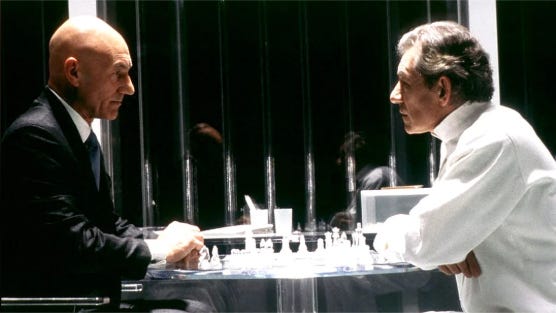Welcome to Vocabulary School, a silly yet instructive newsletter that promotes vocabulary building. Thank you for reading and supporting my work! To help me grow, share with a friend and make sure you are subscribed to get a weekly word to add to your working vocabulary to better communicate with the world.
Over the weekend, my best friend’s husband said that AI can write as well as any living writer, including me. How could someone who is seemingly invested in not only my career but also my mental well being say such a thing? Since I am writing this from my desk and not a lucite prison underneath the Pentagon, it’s clear that I didn’t cause him any harm.
In The New York Times this week, Alessandro Teresigni implored, as an argument against AI “writing,” to not throw away your dictionary. To that I say, “Duh, shit,” even if I think the author gives way too much credit to dictionaries. There is a not insignificant gulf between using a dictionary and surrendering your writing to the writing apps and tools that run on artificial intelligence. People aren’t using one or the other but most likely somewhere in between. The author uses George Orwell’s words from 1946 to decry allowing AI to make decisions for your writing, though I think perhaps a more modern, less on-the-nose example exists in the intervening 80ish years. The author also fails to add anything about education, writing instruction, and practiced communication. I guess all writing and communicating happens by divine intervention? Writing doesn’t happen because you have access to a physical dictionary. Reading and writing are two different skills and neither one is taught by using a dictionary. “AI can’t,” but also, neither can a dictionary.
Spellcheck and autocorrect have been lumped in with AI more recently and even if that’s technically true, it’s not spiritually true. I’m a person and I make a lot of mistakes. I rely on spellcheck to correct my spelling of “occasion” more often than not. Sometimes I have to look up “affect vs. effect.” I look up correct usage for certain words just to make sure that I haven’t actually been using them wrong in public this whole time. You can’t replicate that kind of insecurity with artificial intelligence! You can’t replace a dictionary with AI in the same way you can’t replace a human writer with AI. It gets close but not close enough for it to be worth draining a lake. A dictionary is not a panacea to the encroachment of AI unless it is to beat an AI server to death.
This Week’s Vocabulary List
The Ministry of Time by Kaliane Bradley
Diffidently (adverb): hesitant in acting or speaking due to lack of confidence
Graham is distracted from multitasking cooking and taking a naval college exam, both are suffering under his lack of attention and confidence. He tells the narrator what he’s doing as if he’s embarrassed because he’s missed about 200 years of naval advancements. The narrator replies “equally diffidently” and proceeds to spiral about the prospect of no longer supervising Graham’s transition into this century
Using “diffidently” twice in two lines was an effective choice. The narrator is delivering her observations in a technical way based on Graham’s behavior. Both Graham and the narrator saying anything modified by “diffident” shows that they are both withholding the full scope of their emotions and anxieties.
They spend so much time together that they mirror each other’s behavior. There is no textual evidence to support this claim but this scene reads like the alto line in “One Hand, One Heart” from West Side Story because I’m actually unwell. It’s structural, supportive, and it holds all of the heady romance of the book.
Shout out to one of Vocabulary School’s patron saints,
, who is reading the audiobook while driving. I hope you’re driving safe and enjoying the juicy bits!
Practical Applications
The first time I considered the subject of my newsletter was during a generative writing workshop brainstorm. I diffidently returned to the idea a few times, thinking it was elitist of me to “teach vocabulary.” Then I reminded myself that I actually trained to do that and I just went for it a few months later. To write my newsletter each week, I spend whatever time I can reading and select a word to define. Sometimes I’m reading something that doesn’t use unfamiliar-to-me vocabulary and I have to hunt for something— The New Yorker is a fruitful source when I’m in a vocabulary drought. Occasionally, I select a word I do know but find that its usage is particularly effective or relevant to the circumstances of that week. I have years of training in critical thinking and writing with the student loan balance to match. Demonstrating how a word is effectively used in writing is a worthwhile skill that I’m happy to share.
I standardize my dictionary usage with the Merriam-Webster Online Dictionary and occasionally branch out to the Cambridge Online dictionary for the sake of clarity. Sometimes I use my aunt’s dictionary from 1963 but currently it’s underneath a pile of art supplies that are too inconvenient to unsettle. Most people I talk to about my newsletter and its goals diffidently tell me they haven’t seen a dictionary since attending school or they’ve never sourced a definition while reading. A friend’s husband told me that he never looks up anything and he considers it a tax for not being smart enough in the first place to know something. I would have told him that wasn’t true to comfort him but nothing I said would convince a grown man with a degree he uses for a communication dependent job, a mortgage, a wife, and two kids to use a dictionary, so I simply “thumbs up” reacted to his message.
You deserve to know things. Nothing is shrouded in so much mystery that you aren’t entitled to know it. Sally Rooney is not better than you because she regularly employs the word “recondite” in her writing. You are responsible for the things you do not know in order to turn those things into things you know. Simply electing to not know things is a boring failure of imagination. ChatGPT doesn’t know what it doesn’t know and can’t learn the way a person can in order to successfully learn the previously unknown thing. It doesn’t have creativity, curiosity, or a beating heart to live in the world as a person does. It spits up an approximation of an answer that is, in the best of circumstances, close enough.
Love,
Andrea
Thanks for stopping by Vocabulary School!










This Gen Xer is sending you all the heart emojis, gal. Well, and uniquely, said.